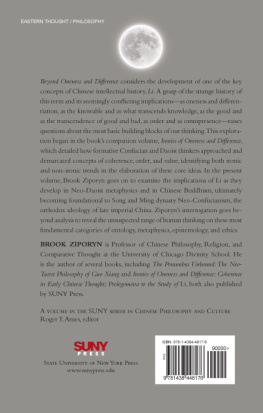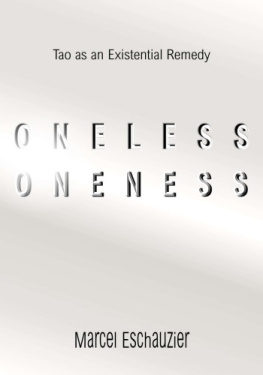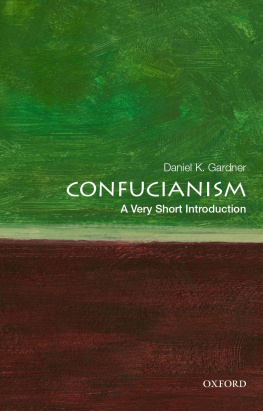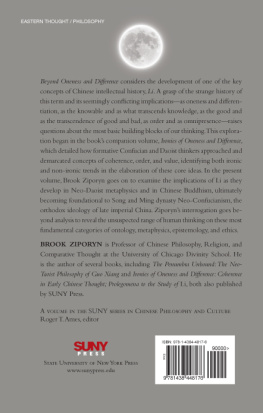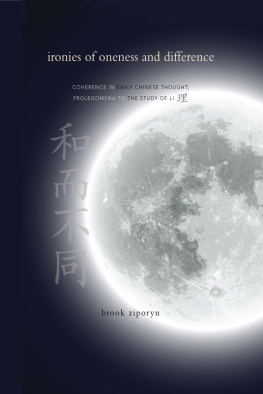BEYOND ONENESS
AND DIFFERENCE
SUNY series in Chinese Philosophy and Culture
______________
Roger T. Ames, editor
BEYOND ONENESS
AND DIFFERENCE
Li and Coherence in
Chinese Buddhist Thought and Its Antecedents
BROOK ZIPORYN
S TATE U NIVERSITY OF N EW Y ORK P RESS
Published by
S TATE U NIVERSITY OF N EW Y ORK P RESS , A LBANY
2013 State University of New York
All rights reserved
Printed in the United States of America
No part of this book may be used or reproduced in any manner whatsoever without written permission. No part of this book may be stored in a retrieval system or transmitted in any form or by any means including electronic, electrostatic, magnetic tape, mechanical, photocopying, recording, or otherwise without the prior permission in writing of the publisher.
For information, contact
State University of New York Press, Albany, NY
www.sunypress.edu
Production, Laurie Searl
Marketing, Anne M. Valentine
Library of Congress Cataloging-in-Publication Data
Ziporyn, Brook, 1964
Beyond oneness and difference : Li and coherence in Chinese Buddhist thought and its antecedents / Brook Ziporyn.
pages cm. (SUNY series in Chinese philosophy and culture)
Includes bibliographical references and index.
ISBN 978-1-4384-4817-6 (alk. paper)
1. Li. 2. Philosophy, Chinese. 3. TruthCoherence theory. I. Title.
B127.L5Z565 2013
181'.112dc23 | 2012045682 |
10 9 8 7 6 5 4 3 2 1
This book is dedicated to the memory of my grandfather, one I. Ziporyn, immigrant, autodidact, Spinozist, and author of Cosmo-Retardation: A Brief Introduction To A Theory Which Shows The Possibility Of Cosmic Function In A Continuum Devoid Of Energy, a work that received, as far as I know, a total of one printed review, in the journal Philosophy of Science, published by the University of Chicago, July 1940.
Here is the entire review, consisting of a single sentence: The mystic use of scientific terms prevents making head or tail of anything in this book. W. M. M.
On second thought: this book is dedicated collectively to I. Ziporyn and this reviewer, W.M.M., in the Borgesian hope that they have by now turned out, in the afterlife, to be two aspects of a single soul.
CONTENTS
INTRODUCTION
L I AND C OHERENCE : R ECAP OF I RONIES OF O NENESS AND D IFFERENCE AND T ERMINOLOGICAL C LARIFICATIONS
CHAPTER ONE
L I AS A F UNDAMENTAL C ATEGORY IN C HINESE T HOUGHT
CHAPTER TWO
T HE A DVENT OF L I , I RONIC AND N ON -I RONIC
CHAPTER THREE
T HE D EVELOPMENT OF L I IN I RONIC T EXTS
CHAPTER FOUR
T HE A DVENT OF L I AS A T ECHNICAL P HILOSOPHICAL T ERM
CHAPTER FIVE
L I AS THE C ONVERGENCE OF C OHERENCE AND I NCOHERENCE IN W ANG B I AND G UO X IANG
CHAPTER SIX
B EYOND O NE AND M ANY : L I IN T IANTAI AND H UAYAN B UDDHISM
CHAPTER SEVEN
M IND , O MNIPRESENCE, AND C OHERENCE IN T IANTAI AND H UAYAN
CONCLUSION
T HE V ERTEX OF THE V ORTEX
EPILOGUE
T OWARD L I IN N EO -C ONFUCIANISM
ACKNOWLEDGMENTS

The acknowledgments section is the customary place in books such as this where the reader, perhaps out of some benevolent combination of default ritual indulgence and behind-the-music curiosity, is prepared to let the author rattle off an invocation of all his or her debts to those persons, places, and things that made the book possible. This is an authors opportunity to reflect a little on how humblingly enormous a portion of what has come about in his or her work has depended on unpredictable external factors, the seemingly almost infinite chain of encounters and supports necessary to bring any finished thing into the world. Though wary of the cringe-making awkwardness that seems likely if not inevitable in such public displays of the private, I will gladly comply with this custom. In addition to those specific persons and institutions I thanked at the beginning of the previous volume, Ironies of Oneness and Differenceand whom I thank anew, with renewed fervor, here and now, adding to the list also Jonathan Sim and Hiromi Okaue for their help preparing the manuscriptI feel these days an ever more insistent impulse to honor this noble tradition of acknowledgment in a more expansive or even global way; for there are so many more acknowledgeable facts and circumstances and things and fortuities left out of such specificities, and though these abstract inanimates and accidents dont care, I still want to acknowledge them, to thank them, to extend some kind of gratitude, or whatever is the equivalent of gratitude when applied to unintentional and inanimate abstract quasi-entities, to the whole mysterious and random concatenation of forces that has made it on the one hand possible and on the other hand permissible for me to write books such as this at all.
Gratitude, however misplaced, is also a fact to be acknowledged. I can only gape in wonder at this seeming stroke of dumb luck, the fact that, having somehow against all odds stumbled upon something I feel both inclined and able to do, Ive so far also been permitted to continue to do it, even to get paid for it, rather than being arrested or lynched or tarred and feathered for it. How many lifeforms ever get so fortunate, to find themselves seemingly unchangeably and unjustifiably constituted in a certain way, and yet also to live in a time and place in which that way of being is viewed as an acceptable way to be, rather than as an atrocity that warrants community wrath, destruction, quarantine, or ridicule? Imagine a person who, for reasons as yet unanalyzed but quite possibly mildly pathological, seems to have always had some kind of ironclad mental block in every situation against doing the assigned reading, as it werewho was too autistic or distracted or arrogant or cowardly or shy or contrarian to listen to anything any living person was trying to teach him, especially persons such as teachers in classrooms. Some kind of nonnegotiable resistance to the very idea of receiving instructionrooted in an obscure but unshakeable doubt that human minds are alike enough for any single minds desires and truths to be likely to be applicable to those of anotherdrives him to the written word, where the sample size is larger and the distance is greater.
But the ban falls quickly also even on books written in the past hundred years or so, in any language he has heard spoken in the flesh; the familiarity of the methods and assumptions of the authors make them too easily imaginable as living presences, and therefore repellent. Here is this person who can only listen to and learn from people who have long been safely dead for a long time, who dont remind him of anyone he knows (i.e., of anyone who, as he sees it in his paranoia, assumes its perfectly fine to try to impose their ideas of what is true and what is good, their facts and values, on him), a person who can only dialogue with people who are far enough away from him in every sense. In the self-imposed intellectual isolation that comes with this condition, after many dismal experiments, it turns out there is only one thing that brings intellectual enlargement and some mental companionship: walking around in solitude, preferably in a city or country where no one knows who he is, reading classical Chinese texts, looking up characters in dictionaries, trying out various possible hypotheses to resolve the seemingly endless thrilling ambiguities, pondering them, trying to make sense of them, then making alternate sense of them, then growing the eyes to look at the world through the blossoming of each of these sets of new ideas that erupt as a result of these phantom encounters.

